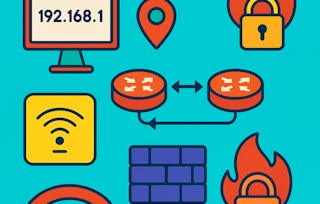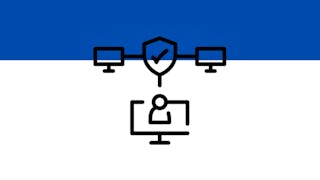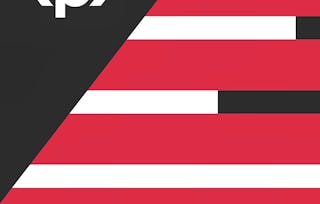The impact of technology and networks on our lives, culture, and society continues to increase. The very fact that you can take this course from anywhere in the world requires a technological infrastructure that was designed, engineered, and built over the past sixty years. To function in an information-centric world, we need to understand the workings of network technology. This course will open up the Internet and show you how it was created, who created it and how it works. Along the way we will meet many of the innovators who developed the Internet and Web technologies that we use today.

Internet History, Technology, and Security
Seize the savings! Get 40% off 3 months of Coursera Plus and full access to thousands of courses.

Internet History, Technology, and Security

Instructor: Charles Russell Severance
148,175 already enrolled
Included with
2,774 reviews
What you'll learn
Understand important technological issues currently facing society.
Understand how the internet and web are spaces for innovation and how you might fit into that innovation.
Skills you'll gain
Tools you'll learn
Details to know

Add to your LinkedIn profile
10 assignments
See how employees at top companies are mastering in-demand skills

There are 11 modules in this course
Welcome to the class. We will first look at the history of the Internet and Web, followed by a look at how the network works and then examine how we secure information on the Internet and Web.
What's included
3 videos3 readings
World War II emphasized the strategic importance of computation, communication, and information. There was unprecedented investment in the development of new technologies during the war. We start with Alan Turing and others at Bletchley Park.
What's included
7 videos1 assignment
In the 1960s and 1970s, there was a great deal of research done to build the first wide-area packet switched networks for the US Department of Defense. In the 1980s, the first “Internet” was formed to allow academic researchers to access supercomputer resources.
What's included
8 videos1 assignment
The World-Wide-Web was invented in 1990 but it was not an overnight success. But by 1994 - “the year of the web” - the web was being widely used and Internet usage was growing by leaps and bounds.
What's included
8 videos1 assignment
The late 1990’s saw the web and Internet used increasingly to revolutionize how business was done. Companies like Amazon were founded and grew very rapidly.
What's included
8 videos1 assignment
The Internet is designed based on a four-layer model. Each layer builds on the layers below it. The Link and Internetwork layers are the lowest layers of that model.
What's included
5 videos1 assignment
The Transport layer is built on the Internetwork layer and is what makes our network connections reliable.
What's included
5 videos1 assignment
With reliable “pipes” available from the Transport layer, we can build applications like web browsers, file transfer applications, or email clients and servers.
What's included
3 videos1 assignment
Using simple examples, we examing how to shield data from prying eyes and make sure that the data was not altered while in transit.
What's included
4 videos1 assignment
We apply the basic ideas of encryption and signing to who we actually secure the connections that we use on today’s Web and Internet.
What's included
4 videos1 assignment
What's included
1 video1 reading1 assignment
Instructor

Offered by
Explore more from Computer Security and Networks

Birla Institute of Technology & Science, Pilani
 Status: Free Trial
Status: Free TrialUniversity of California, Davis
 Status: Free Trial
Status: Free Trial Status: Free Trial
Status: Free Trial
Why people choose Coursera for their career

Felipe M.

Jennifer J.

Larry W.

Chaitanya A.
Learner reviews
- 5 stars
83.18%
- 4 stars
13.85%
- 3 stars
2.20%
- 2 stars
0.32%
- 1 star
0.43%
Showing 3 of 2774
Reviewed on Nov 11, 2016
Very interesting course. The instructor is really helpful and knowledgeable person. Someone interested in internet should take this course. It's awesome and fun to learn.Best of luck!!!
Reviewed on Jun 14, 2016
Dr. Chuck is the best!! The interviews with the Grandfathers and Innovators of the Internet are AWESOME! I highly recommend this class to everyone, you will definitely enjoy it tremendously.
Reviewed on Apr 25, 2019
Great Instructor! I have learnt alot from this course as well as the instructor. I am thankful to coursera for providing me this opportunity to learn from an instructor like Dr. Charles Severance.

Open new doors with Coursera Plus
Unlimited access to 10,000+ world-class courses, hands-on projects, and job-ready certificate programs - all included in your subscription
Advance your career with an online degree
Earn a degree from world-class universities - 100% online
Join over 3,400 global companies that choose Coursera for Business
Upskill your employees to excel in the digital economy
Frequently asked questions
To access the course materials, assignments and to earn a Certificate, you will need to purchase the Certificate experience when you enroll in a course. You can try a Free Trial instead, or apply for Financial Aid. The course may offer 'Full Course, No Certificate' instead. This option lets you see all course materials, submit required assessments, and get a final grade. This also means that you will not be able to purchase a Certificate experience.
When you purchase a Certificate you get access to all course materials, including graded assignments. Upon completing the course, your electronic Certificate will be added to your Accomplishments page - from there, you can print your Certificate or add it to your LinkedIn profile.
Yes. In select learning programs, you can apply for financial aid or a scholarship if you can’t afford the enrollment fee. If fin aid or scholarship is available for your learning program selection, you’ll find a link to apply on the description page.
More questions
Financial aid available,

